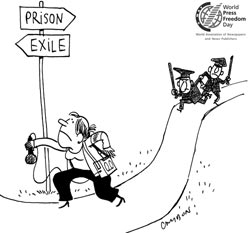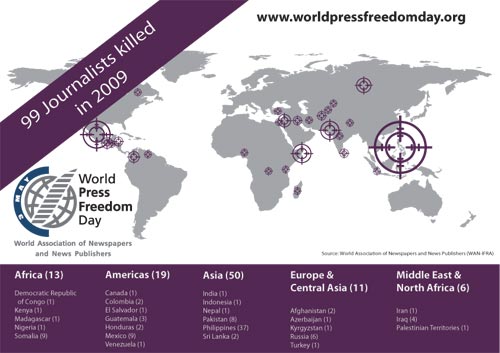To mark tomorrow's World Press Freedom Day, we reproduce here a WAN-IFRA interview with Mansoor Hasaan, an exiled investigative journalist from Pakistan. He wrote for a local magazine, Crime.
His investigations into honour killings, tainted pesticides, narcotic gangs and unsolved murders led him to be beaten up, poisoned and even rammed with a tractor. He fled to Britain in 2002, where he now lives with his family. He spoke exclusively to WAN-IFRA, the World Association of Newspapers and News Publishers for World Press Freedom Day 2010.
What is the passion that drives your hunger for reporting the truth?
After finishing a degree in literature, I started working with my father on his farm. I could see there were many economic and social issues for farmers and their families. I wanted to raise the plight of people in the rural areas of Pakistan and so started a magazine with another journalist.
Could you comment on what it's like being a journalist investigating MPs and business leaders on issues like honour killings and justice for farmers.
Sometimes, I wrote under a pen name to protect myself. My father advised me not to write about MPs or the business elite, because he knew them and was scared about reprisals.
It was a difficult time reporting on the pesticide issue. An MP and the owner of the agricultural company I exposed through my investigations sent a man to my office to threaten me, advising me not to write about the tainted pesticides.
But I wanted justice for the farmers, so I published the story. I was then attacked in my office.
I wrote another story on a different MP who was implicated in an honour killing. After it was published, he sent his henchmen to kill me by smashing into my car with a tractor. It was a very scary time for myself and my family, but it was also important to report these injustices.
What drove you to flee your country?
The threats and attacks kept coming even after I stopped writing for my magazine and joined a larger daily newspaper, where I thought I would be safe.
I started to investigate drug activities and was shocked to discover that the owner of the newspaper I now worked for had been implicated. When I was about to expose this, I was forced to resign. Again I was visited by people warning me about my journalist activities, but this time the visit was from the local intelligence bureau, so I became really scared.
The final straw came when somebody tried to shoot me in the street. I knew then I had to leave. I had no job and no money and I urged my extended family and friends to help, but no one was prepared to do anything for us.
What sort of impact did this have on your family?
At the time, I was injured from the various attacks and not in good health. When I actually fled Pakistan to Britain, I felt sick to my stomach because I was leaving my family behind. My children were terrified and felt very isolated. I thought, 'Will I ever see my family again?' My wife continued to receive threatening calls even after I had gone.
After some time, I managed to get odd jobs in Britain and I had enough money to move my family over. I was very happy.
You've had a harrowing journey to ensure your family is safe. Describe what life is like now and how you feel about the future.
I am hopeful for my children as they will receive a good education and we will beat poverty. I paid a very high price for my profession because I wasn't allowed to work while I sought asylum, so this made life difficult. I am now a resident of Britain, so I can work again. I help other refugee and asylum seekers through the Red Cross tracing and messaging service, but I will find it difficult to get work again as a journalist.
Freedom of expression must be recognised as a fundamental principle in the global fight against issues like corruption and violations of human rights. You've been at the heart of this fight; what is your message to the community about the importance of a free press?
I know all journalists want to be the best, but your family and your life are also precious. If you investigate stories because you think it will bring justice, in some countries you are threatened.
We celebrate press freedom days every year but we must not forget those who were murdered while working for press freedom. Their pictures are in magazines and on websites but their children have only gravestones to see.
Protect journalists: UN chief tells governments
United Nations Secretary General Ban Ki-moon, in his message to mark World Press Freedom Day which falls on May 3 has said all governments have a duty to protect those who work in the media and that this protection must include investigating and prosecuting those who commit crimes against journalists.
 |
| Ban Ki-moon: many governments restrict media
freedom |
The UN chief said freedom of expression was a fundamental human right, enshrined in article 19 of the Universal Declaration of Human Rights but around the world, governments and those wielding power found many ways to obstruct it.
"They impose high taxes on newsprint, making newspapers so expensive that people can't afford to buy them. Independent radio and television stations are forced off the air if they criticize government policy. The censors are also active in cyberspace, restricting the use of the Internet and new media," Mr. Ban said.
Last year, the United Nations Educational, Scientific and Cultural Organization (UNESCO) condemned the killing of 77 journalists. "I condemn these murders and insist that the perpetrators are brought to justice," the UN chief said.
He welcomed the global trend towards new laws which recognize the universal right to publicly held information but noted that unfortunately, "these new laws do not always translate into action".
Requests for official information are often refused, or delayed, sometimes for years. At times, poor information management is to blame. But all too often, this happens because of a culture of secrecy and a lack of accountability," Mr. Ban said.
He called on governments, the civil society and people around the world to recognize the important work of the media, and to stand up for freedom of information.
Police probe on missing journalist draws blank
 |
| Ekneligoda |
Ninety six days after the disappearance of lankeenews.com journalist Prageeth Ekneligoda, Police are yet to come up with any clues about his whereabouts, Police spokesman Prishantha Jayakoday said.
The disappointing news from the police came as journalists and media rights activists prepare to mark World Press Freedom Day, May 3.
Mr. Ekneligoda has been missing since January 24 and his wife Sandya Eknaligoda said she feared he was abducted. Alleging police inaction, she has written to President Mahinda Rajapaksa and filed a habeus corpus case.
The Colombo Crimes Division which is carrying out the investigations has found no clues so far, the Sunday Times understands.
|





